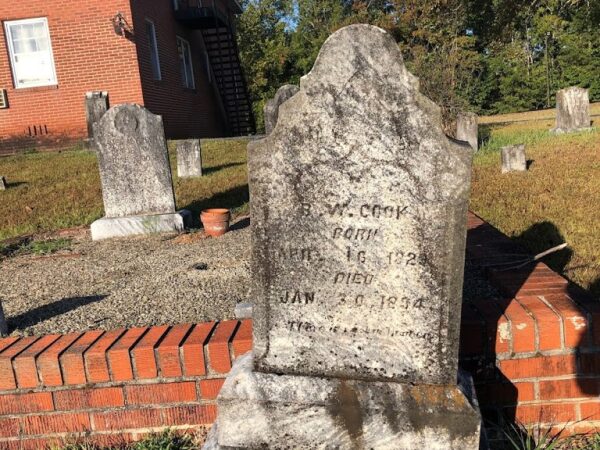It was 1871 and, although the Civil War had been over for many years, for many Southerners it was far from over. Many struggled with substantial losses on a variety of levels. Land stripped and void of vegetation, loss of farm animals and in many cases the complete loss of their homes and personal belongings all contributed to a sense of desperation. It would take many years to establish a sense of normalcy in their lives and some would never fully recover. Living just outside of Atlanta, Georgia, the Ganus families were among the many that struggled.
 |
| North Side of Atlanta following the war Library of Congress |
Beginning in March of 1871, the federal government allowed citizens in some Southern states to file for compensation for the losses sustained during the Civil War. Applicants were required to prove that property was taken or destroyed by the Union Army. In addition, applicants were required to prove that they remained loyal to the federal government during the war. Thousands of Southern citizens sought relief from their impoverished condition by applying. Burton W. Cook and wife Mary (Ganus) were among those who applied.
In Clayton County, Georgia on the 26th of June, 1871, Burton filled out an application for losses he suffered at the hand of the Union Army. His claim was rejected without justification.
The paperwork however still contributes information to what is known about Burton. Filed among the Southern Claims Commission papers, Barred and Disallowed, Burton claimed the loss of a mare valued at $100.00 and 35 bushels of corn valued at $35.00. He indicated the property was taken in Fayette County, Georgia by General Sherman’s army on its way to Jonesboro on 31st of August, 1864.
Anxious for any opportunity to receive their “just dues” from the federal government, many Southerners filed erroneous claims. The question is not whether Burton’s family suffered losses, but whether Burton was always loyal to the US Government? I suspect I know the answer. While Burton’s damages pale in comparison to many other claims, unfortunately, his claim also lacks the testimony that accompanies many claims. As luck would have it, his file consists of four pages of the basic form, with no additional testimony.
The files can provide interesting reading. Some include testimony in which the claimant describes in great detail the harsh circumstances personally endured. Some include dramatic statements of their professed allegiance to the government. Often such richly woven stories include the names of family, neighbors and friends. I found myself smiling at one such lengthy claim that comprised many pages of testimony describing the claimant’s love for the federal government in addition to his secret disdain for the rebel cause. The claimant added that he had always supported the federal government. Unfortunately his case was rejected with the conclusion that not only had the man supported numerous sons while they served as Confederate soldiers, but he himself had served for a time and had contributed substantial funds and supplies to the Confederate Army.
Burton too had served in the Confederate Army from the beginning of the war until the end when he was released as a prisoner of war, and yet he filed a claim. Was his application simply an effort to receive compensation for losses?
The basic form that Burton filled out required that the applicant provide the names of individuals who could verify the truth of the claim. I was interested to know who he listed and was pleased to see his witnesses were James Ganus of East Point, Fulton County, Georgia and Mary Cook, also of East Point. Mary was Burton’s wife and James was his father-in-law. While the document does not contain James’ actual signature, it does give me reason to believe that James lived at least until June of 1871 when the application was filled out. James was shown living with Burton and daughter Mary on the 1870 US Federal Census. This is the latest document currently known on which James’ name appears. James would have been approximately 72 years old, a ripe old age for that time.
While Burton’s file is relatively small, I am grateful for the few details it provides. Once again I am reminded of the benefits of finding all documents relating to our ancestors.
I am sure Burton felt at least some disappointment when his claim was rejected, although his situation was not uncommon. The number of people claiming property loss greatly exceeded the number who received compensation. Undoubtedly, for those who had been so vested in the Southern cause, proving their loyalty to the US Government was a difficult sell.
The war was over, issues continued and yet slowly the South did rebuild. While much had been destroyed, the unconquerable spirit for which Southerners were known survived. And so, Burton and his family, along with countless others, began the tedious process of rebuilding.
Copyright © Michelle G. Taggart 2014, All rights reserved




We must be on parallel research paths. Just yesterday I found a similar claim by one of my ancestors seeking compensation for some hay and corn taken by the Confederates. Like your Burton, my ancestor said he had been loyal, having not voted for secession.
How devastating it must have been for the average citizens living through those times to attempt rebuilding their lives. And yet, how sad to read of the desperation you must have seen in those applications from Southerners who, in order to get much needed help, had to turn their back on all they had previously supported. A difficult situation.
War is such ugly business and there's so much destruction. It's hard to imagine climbing out the ruin back to something like the old way of life. And who, whose property and life was ruined, wouldn't want help getting back to normal? I suppose it would have been hard for the federal government to adequately research who had helped the South and who hadn't.
It's wonderful you found this file, though, even if it was only 4 pages.
Yea I am not sure exactly how the Federal Government knew because they certainly didn't punch their name in a computer or look them up in a database. I do know that they interviewed individuals and maybe some were more forthcoming than others.
It's hard to put myself in their shoes in my own comfortable surroundings and imagine the grief they were experiencing. There was so much loss on so many levels. I've heard it said for them, it wasn't a lie if you told it to a Yankee……I am sure the anger they felt for those they had fought made it a little easier to say things they didn't quite feel in their heart in order to get help.
We sure must Wendy. With these folks I keep thinking "desperate times call for desperate measures"…..I can't imagine how they felt.
I am sure if we are both researching in the South we are going to cross paths a lot. (now lets try and find a common ancestor! That would be fun!)